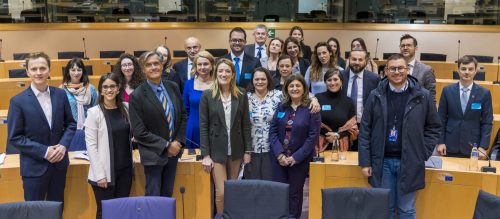
The first PATFox event in Brussels
On February 28, PATFox project partners met in Brussels for the event“Anti-SLAPP legal training: Experiences from the PATFox project”.
The event was held at the European Parliament thanks to the support of the Chairman of the European Parliament’s Committee on Civil Liberties, Justice and Home Affairs (LIBE), Mr. Juan Fernando López Aguilar.
The President of the European Parliament, Roberta Metsola, gave the closing speech together with Juan Fernando López Aguilar.
The event, attended by MEPs, jurists, academics, NGO representatives and journalists, was aimed at presenting the study plan being carried out under the project, as well as sharing first impressions from local workshops and engaging in a discussion on anti-SLAPP initiatives.
At the first round tableOur European legal expert, Professor Justin Borg Barthet, Vanja Juric, a lawyer from Croatia and also a member of the European Commission’s expert group on SLAPPs, and Bettina Behrend, board member of Rettet den Regenwald (Save the Rainforest), prepared the ground by discussing the challenges and opportunities of taking action against SLAPPs.
Rettet den Regenwald’s participation was very timely, as the organization had recently announced the resolution of the lawsuit filed against it by an Indonesian company. Bettina Behrend was able to explain that, although the settlement agreement was largely favorable to the NGO, the organization had experienced significant difficulties in reaching this resolution.
Professor Borg-Barthet characterized the SLAPPs as fundamentally “a misuse of the legal process to manipulate democratic processes”. One of the key issues for legal practitioners facing SLAPPs is to understand that these claims are about a misuse of the process to suppress the defendant’s rights and not about a balancing of rights in the usual way.
Vanja Juric stressed that SLAPPs, which can cause “existential” problems for individual defendants, can in turn become systemic problems for democratic societies.
This initial discussion was followed by a series of round tables bringing together those directly involved in training in the 11 project countries: Bulgaria, Croatia, Cyprus, Germany, Hungary, Malta, Poland, Romania, Slovakia, Slovenia and Spain.
During the first panel “First steps – introduction to the topic of SLAPPs”, Prof. Dr. Dr. Maria Krambia Kapardis (CUT), Anuška Podvršič (Open), and Yana Peloska (MDC), together with Ivan Godarsky (Memo’98) compared and evaluated their experiences in introducing the topic of SLAPPs in their national context, while Theodoros Economou and Tomáš Langer, lawyers and legal trainers at PATFox, contributed their experience as practicing lawyers in this field.
The second roundtable, “Building an anti-SLAPP advocacy network”, delved into the difficulties encountered in building an anti-SLAPP network at both local and European level, with Carla Camilleri (Aditus), and PATFox trainers Michael Zammit Maempel, AnnaWojcik (OKO) and Polish lawyers Krzysztof Pluta and Cristina Lupu (CJI). This panel led to a fruitful discussion among participants from Malta, Romania and Poland on the nature of SLAPP tactics: as reforms are introduced into national legal systems, SLAPP plaintiffs become adept at finding other weaknesses to exploit.
In the third panel, “Responding to a challenging external environment”, Sandor Orban (CIJHU) and Sanja Pavic (GONG), together with PATFox legal trainers Bea Bodrogi and VanjaJurić, focused on specific issues related to the hostile contexts faced by Hungary and Croatia. Human rights lawyer Bea Bodrogi, who delivered the first PATFox training in Hungary, drew particular attention to the use of the General Data Protection Regulation (GDPR) for abusive purposes.
“SLAPPs, environmental activism and human rights defenders” was the focus of the last panel discussion. was the central theme of the last panel discussion, which featured Philipp Wissing (Blueprint for Free Speech), attorney Dr. NadineDining and Alessia Schiavon, Executive Director of FIBGAR and Project Coordinator.
Although the discussion at this last roundtable was subject to some time constraints, Alessia Schiavon described some of the particular obstacles she had encountered in introducing the SLAPP concept, first characterized as such in English-speaking jurisdictions, in Spain.
The reception of the debate in Germany was subject to a similar “ambivalence”: while German NGOs (especially in the environmental field) and journalists are well aware of the prevalence of SLAPPs, there is some reluctance to acknowledge the phenomenon at the official level. Efforts are currently underway at the national level to develop a study on the prevalence of SLAPP cases in an effort to move this discussion forward.
A recording of the event is available here: https://youtu.be/4ohABfutrtE
Madrid, March 13, 2023



